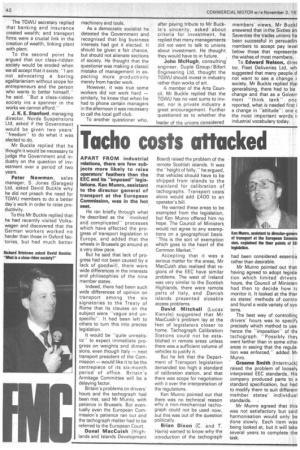Tacho costs attacked
Page 44

If you've noticed an error in this article please click here to report it so we can fix it.
APART FROM industrial relations, there are few subjects more likely to raise operators' feathers than the EEC and its "imposed" legislations. Ken Munro, assistant to the director general of transport at the European Commission, was in the hot, seat.
He ran briefly through what, he described as the "involved' and complicated"' processes which have affected the progress of transport legislation in Europe, and added that the wheels in Brussels go around at a very slow pace.
But he said that lack of progress had not been caused by a lack of goodwill, there were wide differences in the interests and philosophies of the nine member states.
Indeed, there had been such wide differences of opinion on transport among the six signatories to the Treaty of Rome that its clauses on the subject Were -vague and unspecific-. It had been left to others to turn this into precise legislation.
It would be "'quite unrealisticto expect immediate progress on weights and dimensions, even though Italy — next transport president of the Commission — would like it to be the centrepiece of its six-month period of office. Britain's Armitage Committee will be a delaying factor.
Britain's problems on drivers' hours and the tachograph had been met, said Mr Munro, with patience in Brussels. But eventually even the European Commission's patience ran out and the tachograph matter had to be referred to the European Court.
Donal MacCuish (Highlands and Islands Development Board) raised the problem of the remote Scottish islands. It was the -height of folly," he argued, that vehicles should have to be shipped from islands to the mainland for calibration of tachographs. Transport costs alone would add £400 to an operator's bill.
He wanted these areas to be exempted from the legislation, but Ken Munro offered him no hope. The Council of Ministers would not agree to any exemptions on a geographical basis. "This is the sort of exemption which goes to the heart of the Common Market."
Accepting that it was a serious matter for the areas, Mr MacCuish also realised that regions of the EEC have similar problems. The west of Ireland was very similar to the Scottish Highlands, there were remote parts of Italy, and .Danish islands presented sizeable access problems.
David Mitchell (Lucas Kienzle) suggested that Mr MacCuish's problem lay at the feet of legislators closer to home. Tachograph Calibration Stations could not be established in remote areas unless there was a sufficient volume of vehicles to justify it.
But he felt that the Department of Transport legislation demanded too high a standard of calibration station, and that there was scope for negotiation with it over the interpretation of the regulations.
Ken Munro pointed out that there was no technical reason why a non-mechanical tachograph could not be used now,. but this was out of the question politically.
Ilium Dixon (C. and T. Harris) wanted to know why the introduction of the tachograph
had been considered essentia. rather than desirable.
Mr Munro pointed out that having agreed to adopt legisla tion which limited drivers hours, the Council of Minister: had then to decide how tc monitor it. It looked at the ther six states' methods of contro and found a wide variety of systems.
The best way of controllinç drivers' hours was to specify precisely which method to use, hence the "imposition" of thE tachograph. "Possibly they went farther than in some othei areas in seeing that the regulation was enforced," added Mr Munro.
Graeme Smith (Intertruck) raised the problem of loosely interpreted EEC standards. His company produced parts to a standard specification, but had to modify them to suit different mernber states' individual standards.
Mr Munro agreed that this was not satisfactory but said harmonisation would only be done slowly. Each item was being looked at, but it will take several years to complete the task.




























































































































